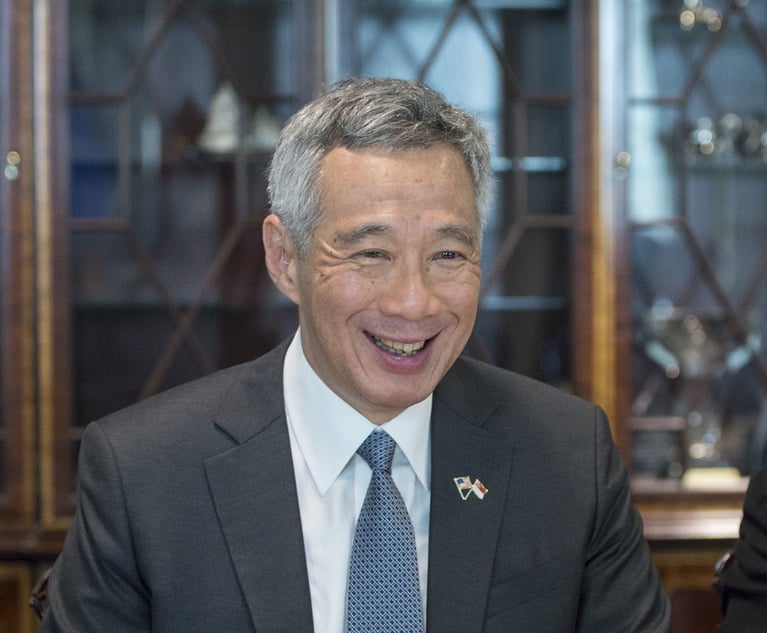Clydes forms new India tie-up after partners split from best friends firm
Clyde & Co has ended its relationship with India best friend ALMT Legal and set up ties with a breakaway group of partners from the firm. Five partners have left ALMT to set up a new boutique, Clasis Law, with Clydes set to continue to operate in the region via a relationship with the new firm.
April 27, 2011 at 09:54 AM
2 minute read
Clyde & Co has ended its relationship with India best friend ALMT Legal and set up ties with a breakaway group of partners from the firm.
Five partners have left ALMT to set up a new boutique, Clasis Law, with Clydes set to continue to operate in the region via a relationship with the new firm.
In addition, Clydes Dubai corporate partner Abhimanyu Jalan is leaving the firm to join Clasis, which opened on 1 April this year with three offices in Mumbai, New Delhi and London.
ALMT corporate and commercial partner Aliff Fazelbhoy said: "Given the views of the majority of the ALMT partners, we felt it best to help facilitate this separation so both groups can focus on their different objectives. While we are sad to lose some of our friends as partners we believe that this separation is in the best interest of all. We wish Clasis every success."
The five ALMT partners breaking away are Ishtiaq Ali (project finance and banking) and Renu Parekh (litigation) in Mumbai, Vineet Aneja (corporate) in New Delhi, and Sakate Khaitan (corporate) and Shalini Agarwal (corporate) in London. The departures leave ALMT with 12 remaining partners.
Clydes first set up its best friends relationship with the firm in June 2009. Chief executive Peter Hasson (pictured) said: "We are pleased that the formal association that Clydes had with ALMT will transfer to the new firm Clasis Law and that we will continue to work with partners and lawyers for whom we have formed great respect.
"We believe in the model of an international Indian law firm and are pleased that the Clasis Law partners remain as convinced of this as us.
"From the perspective of Clydes, our focus on emerging markets means we cannot ignore the Indian market and our established working relationships and client referrals with Clasis Law partners will continue to enable us to provide a distinctive offering to Indian and international clients."
The news comes after Clifford Chance ended its 'best friends' relationship with Indian outfit AZB & Partners in January this year, with the decision taken due to fading hopes for the liberalisation of the Indian legal market.
This content has been archived. It is available through our partners, LexisNexis® and Bloomberg Law.
To view this content, please continue to their sites.
Not a Lexis Subscriber?
Subscribe Now
Not a Bloomberg Law Subscriber?
Subscribe Now
NOT FOR REPRINT
© 2025 ALM Global, LLC, All Rights Reserved. Request academic re-use from www.copyright.com. All other uses, submit a request to [email protected]. For more information visit Asset & Logo Licensing.
You Might Like
View All
Singapore Leaders Stress the Importance of the Rule of Law Amid Geopolitical Tensions

Can Law Firms Avoid Landing on the 'Enemy' List During the Trump Administration?
5 minute read

Letter From Asia: Will Big Law Ever Bother to Understand Asia Again?
Trending Stories
- 1'A Death Sentence for TikTok'?: Litigators and Experts Weigh Impact of Potential Ban on Creators and Data Privacy
- 2Bribery Case Against Former Lt. Gov. Brian Benjamin Is Dropped
- 3‘Extremely Disturbing’: AI Firms Face Class Action by ‘Taskers’ Exposed to Traumatic Content
- 4State Appeals Court Revives BraunHagey Lawsuit Alleging $4.2M Unlawful Wire to China
- 5Invoking Trump, AG Bonta Reminds Lawyers of Duties to Noncitizens in Plea Dealing
Who Got The Work
J. Brugh Lower of Gibbons has entered an appearance for industrial equipment supplier Devco Corporation in a pending trademark infringement lawsuit. The suit, accusing the defendant of selling knock-off Graco products, was filed Dec. 18 in New Jersey District Court by Rivkin Radler on behalf of Graco Inc. and Graco Minnesota. The case, assigned to U.S. District Judge Zahid N. Quraishi, is 3:24-cv-11294, Graco Inc. et al v. Devco Corporation.
Who Got The Work
Rebecca Maller-Stein and Kent A. Yalowitz of Arnold & Porter Kaye Scholer have entered their appearances for Hanaco Venture Capital and its executives, Lior Prosor and David Frankel, in a pending securities lawsuit. The action, filed on Dec. 24 in New York Southern District Court by Zell, Aron & Co. on behalf of Goldeneye Advisors, accuses the defendants of negligently and fraudulently managing the plaintiff's $1 million investment. The case, assigned to U.S. District Judge Vernon S. Broderick, is 1:24-cv-09918, Goldeneye Advisors, LLC v. Hanaco Venture Capital, Ltd. et al.
Who Got The Work
Attorneys from A&O Shearman has stepped in as defense counsel for Toronto-Dominion Bank and other defendants in a pending securities class action. The suit, filed Dec. 11 in New York Southern District Court by Bleichmar Fonti & Auld, accuses the defendants of concealing the bank's 'pervasive' deficiencies in regards to its compliance with the Bank Secrecy Act and the quality of its anti-money laundering controls. The case, assigned to U.S. District Judge Arun Subramanian, is 1:24-cv-09445, Gonzalez v. The Toronto-Dominion Bank et al.
Who Got The Work
Crown Castle International, a Pennsylvania company providing shared communications infrastructure, has turned to Luke D. Wolf of Gordon Rees Scully Mansukhani to fend off a pending breach-of-contract lawsuit. The court action, filed Nov. 25 in Michigan Eastern District Court by Hooper Hathaway PC on behalf of The Town Residences LLC, accuses Crown Castle of failing to transfer approximately $30,000 in utility payments from T-Mobile in breach of a roof-top lease and assignment agreement. The case, assigned to U.S. District Judge Susan K. Declercq, is 2:24-cv-13131, The Town Residences LLC v. T-Mobile US, Inc. et al.
Who Got The Work
Wilfred P. Coronato and Daniel M. Schwartz of McCarter & English have stepped in as defense counsel to Electrolux Home Products Inc. in a pending product liability lawsuit. The court action, filed Nov. 26 in New York Eastern District Court by Poulos Lopiccolo PC and Nagel Rice LLP on behalf of David Stern, alleges that the defendant's refrigerators’ drawers and shelving repeatedly break and fall apart within months after purchase. The case, assigned to U.S. District Judge Joan M. Azrack, is 2:24-cv-08204, Stern v. Electrolux Home Products, Inc.
Featured Firms
Law Offices of Gary Martin Hays & Associates, P.C.
(470) 294-1674
Law Offices of Mark E. Salomone
(857) 444-6468
Smith & Hassler
(713) 739-1250








